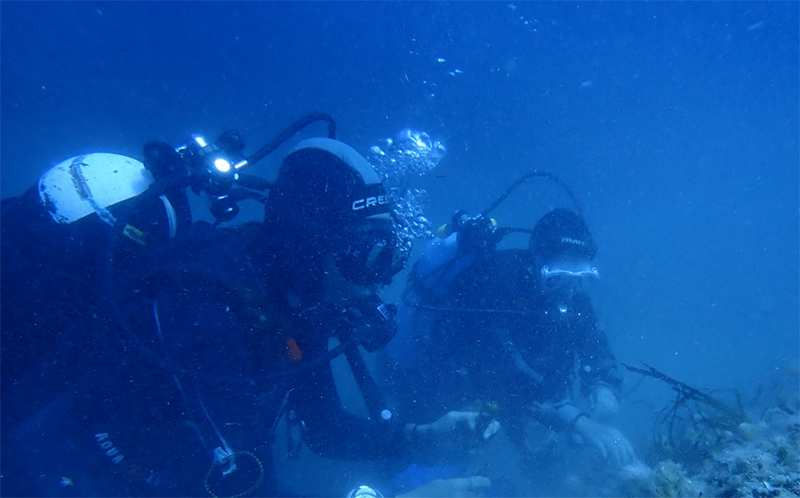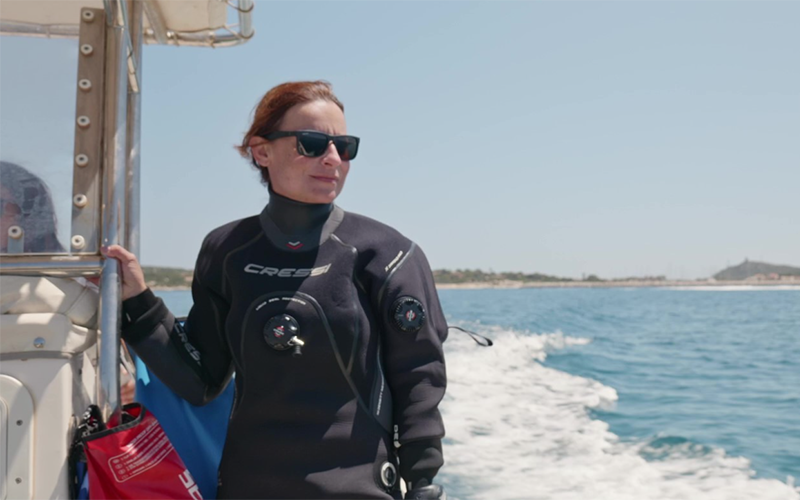Different islands, but similar issues for marine ecosystems, which are heavily threatened by unregulated anchoring from recreational boating and illegal trawling. In Malta, as in Sardinia, the damage is particularly evident in the Posidonia oceanica meadows, an endemic species of the Mediterranean Sea and a crucial habitat for marine life and oxygen production.
In this context, marine reforestation activities were completed last week off the coast of the Natura 2000 site in Qawra, Malta. This is the first marine reforestation project in the Maltese State, aimed at supporting the natural restoration of Posidonia oceanica meadows in areas surveyed last summer, showing signs of degradation, primarily due to recreational boating. The activities were conducted by the marine team of the Italian MEDSEA Foundation, in collaboration with the University of Malta. Approximately 1,500 cuttings, exclusively from naturally uprooted plants, were selected, collected, and replanted in the damaged areas, covering a one-hectare area at a depth of 6 meters along the Qawra coast.
Previously, as part of the same biodiversity protection initiative in the Mediterranean, reforestation activities also involved the “Capo Carbonara” Marine Protected Area in Sardinia, aiming to expand the replanting area initiated in previous years to cover new adjacent sites. The activities, which started last spring, are now nearing completion. An additional 500 m² of degraded area will be restored, with approximately 6,000 new cuttings planted in the affected areas.
The Posidonia oceanica meadow restoration project in Malta, coordinated by the Cagliari-based MEDSEA Foundation, aims to protect and regenerate one of the most valuable marine ecosystems in the Mediterranean through the campaign “A Marine Forest to Save the Planet.” Developed with the support of Fondation de la Mer (FdM), a private French foundation dedicated to protecting Mediterranean biodiversity, and the CMA CGM Group, a global leader in maritime, land, air, and logistics solutions, the project represents an innovative intervention for the conservation of marine habitats. Field activities in Malta were conducted by MEDSEA experts in collaboration with the University of Malta's Oceanography Malta Research Group (OMRG), Department of Geosciences, and were authorised by the Environment and Resources Authority (ERA), Malta's environmental authority. These operations are recognized as strategic initiatives for the protection and restoration of the Maltese marine ecosystem, with the goal of strengthening habitat resilience and promoting local biodiversity.
Alan Deidun, Malta’s Ocean Ambassador and a professor at the Oceanography Malta Research Group (OMRG) of the University of Malta’s Department of Geosciences, praised this historic first attempt to restore Posidonia oceanica meadows in Maltese waters, calling it “a milestone in local environmental management efforts.” Deidun also expressed his hope that this investment in marine restoration would be safeguarded from any human disturbance (such as anchoring) to allow the transplanted meadow patches to recover.
Posidonia oceanica meadows, an endemic Mediterranean species, are a priority habitat that performs numerous essential functions for the ecosystem, including regulating seawater acidity, producing oxygen, capturing CO₂, providing shelter for many marine organisms, and protecting coastlines from erosion. This habitat, often threatened and damaged by human activities such as recreational boating and illegal trawling, is in decline across the Mediterranean. “This plant grows very slowly, leading to extremely long recovery times,” explains Francesca Frau, MEDSEA project coordinator and marine biologist. “For this reason, we work to protect and conserve this habitat through activities like this one, known as ‘active restoration,’ to facilitate and thus accelerate the natural recovery of this crucial habitat for the health and balance of the marine ecosystem.”
The project in Malta also includes knowledge transfer on transplantation techniques to local scientific teams, so that “from this initial intervention, these activities may be independently carried out in the future,” Frau continues. “We are pleased to have initiated this first intervention and hope to see growing interest from private companies and Mediterranean governments in marine conservation through seagrass protection and restoration projects. This is certainly a good start towards a joint and sustainable long-term commitment,” the biologist concludes.
In Sardinia, the activities took place in the Capo Carbonara Marine Protected Area off Villasimius.
Valeria Masala, director of the Capo Carbonara Marine Protected Area, emphasized:
"For some time now, we have adopted significant initiatives to restore the seagrass meadows of Posidonia oceanica, which are essential for the Mediterranean marine ecosystem. These initiatives include the installation of mooring buoys to prevent anchoring damage to the seagrass meadows (thanks to funding from the PNRR and the LIFE project). Since 2017, we have been restoring the seabed with Posidonia oceanica through the LIFE RES MARIS project, launched in 2014. These meadows cover approximately 22% of the MPA’s seabed, which extends over 14,000 hectares, with a balanced distribution between the east and west sides of Capo Carbonara. In this latest international project, we have planted about 4,500 cuttings over the past few months on 300 m², with the goal of covering an additional 200 m². These joint efforts are aimed at preserving and restoring the marine ecosystem of the Capo Carbonara MPA, ensuring the area’s environmental sustainability and biodiversity."
Anne-Sophie Cochelin, Vice President of Sustainability at CMA CGM, says: “Restoring Posidonia through this partnership is part of the CMA CGM Group’s long-standing commitment to preserve marine biodiversity and the oceans. The Mediterranean is heavily impacted by global warming, which is destabilising ecosystems and exacerbating the collapse of both terrestrial and marine biodiversity. It is crucial to take action and support local experts to protect these meadows. This initiative is also part of a broader portfolio of actions, including rerouting vessels to avoid cetacean breeding areas in the Hellenic Trench, measuring the effects of ecological restoration with Ifremer, and installing artificial habitats in the port of Marseille with Ecocean.”
Latest news

ARTEMIS: Marine Reforestation Activities Begin in Northern Sardinia
Marine reforestation efforts under the European Interreg Euro-MED “ARTEMIS” project have officially begun off the northern coast of Sardinia, in Santa Teresa Gallura.

REST-COAST: Strategies for the Protection of European Coasts Outlined in Catania
From March 24 to 27, 2025, the annual meeting of the European project REST-COAST, funded by the Horizon 2020 program, was held in Catania. The meeting marked a key milestone toward the…

A Forest for Bees Takes Root in Sardinia: Restoring Nature, Supporting Pollinators
The planting operations for the first Forest for Bees installation—a forest for bees—have been completed in Sennariolo (OR). This is a special one-hectare forest dedicated to bees and pollinators, essential insects for food…

Altare Hosts RICREA Meeting: Shared Strategies Through Ecological Transition Contracts
The third Steering Committee of the RICREA project – Collaborative Network for the Capitalization of REtrAlags – was held in Altare (Savona). The project is funded by the Italy–France Maritime Interreg Programme.

GRRinPORT2: Innovation and Cross-Border Cooperation for Environmental Protection of Ports
On March 20–21, 2025, the Kickoff Meeting of the GRRinPORT2 project – Management of water, waste, and sediments to reduce pollution in ports – was held at the DESTEC Department of the University of Pisa…

MEDSEA Launches the Wetland4Change Project in Terralba to test and validate climate change's solutions
On Friday, March 14, 2025, in the council chamber of Terralba, MEDSEA held a meeting with the Municipality of Terralba to officially introduce Wetland4Change to stakeholders (productive activities, as well as institutional…

In Crete with ARTEMIS to protect seagrass meadows: 2nd Consortium Meeting
From March 4th to 6th, 2025, Heraklion (Crete) hosted the mid-term meeting of the ARTEMIS Interreg Euro-MED Natural Heritage project, organized by the Hellenic Marine Research Centre. This was a crucial moment to…

MEDSEA Heads to Tallinn for the Blue4All Consortium Meeting
Last January, the Blue4All project team gathered in Tallinn for the Consortium Meeting, marking the project's halfway point. The event, hosted by the local partner Keskkonnaamet/Estonian Environmental Board and the University of Tartu, brought together all 22 project partners from across…

ImPelaghiamoci: A Year of Initiatives to Learn About and Protect Cetaceans with the Municipality of Sassari
Promoting greater knowledge of the resident cetaceans in the Pelagos Sanctuary*, a transboundary marine protected area encompassing France, Liguria, Tuscany, and Sardinia, to improve the protection and conservation of these species…

Reforestation Operations Resume in Montiferru: A Forest for Bees by MEDSEA
Reforestation efforts in Montiferru, led by MEDSEA, are back on track. Following the planting of the first 5 hectares of olive trees, holm oaks, and Mediterranean shrubs, the focus now shifts to melliferous plants to…

25 Events in Sardinia for World Wetlands Day
Wetlands such as ponds, lagoons, lakes, rivers, and peatlands form an endless world of aquatic ecosystems. In Sardinia, the call to explore these habitats is open this February with the Sardinian edition of World Wetlands Day.

COASTRUST: Launching Sustainable Coastal Management in Domus de Maria Sardinia
The activities of the COASTRUST project, funded by the European Interreg Euro-MED program, have officially begun in Sardinia. The initiative aims to promote shared environmental management in the Mediterranean's coastal areas, addressing anthropogenic pressures…

Join the World Wetlands Day Sardinia 2025 Calendar: register your Event by January, 22nd
World Wetlands Day is celebrated every year on February 2, marking the adoption of the Convention on Wetlands signed on February 2, 1971, in Ramsar, on the shores of the…

MEDSEA joins the Camargue Red Alert with the Mediterranean Alliance for Wetlands to save birdlife
The MEDSEA Foundation has officially joined 73 other international organizations in signing the Camargue Red Alert, a collective call to action to safeguard the Camargue wetlands in France.

Wetland4Change: MEDSEA in Valencia to Explore Natural Climate Solutions Through Wetlands
The MEDSEA team participated in the second Consortium meeting of the Wetland4Change project in Valencia from November 26 to 28, 2024. The meeting was organized by local project partners, the…

Malta’s First Posidonia Meadow Restoration Project Led by MEDSEA Foundation
Different islands, but similar issues for marine ecosystems, which are heavily threatened by unregulated anchoring from recreational boating and illegal trawling. In Malta, as in Sardinia, the damage is particularly…
- 1
- 2
- 3
- 4





